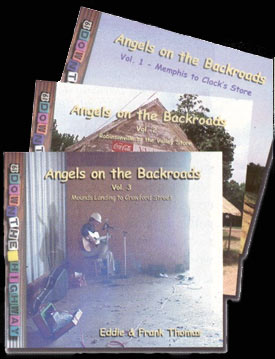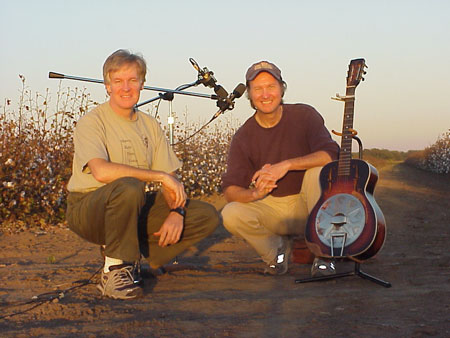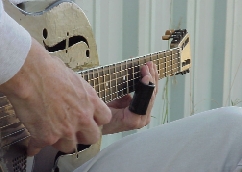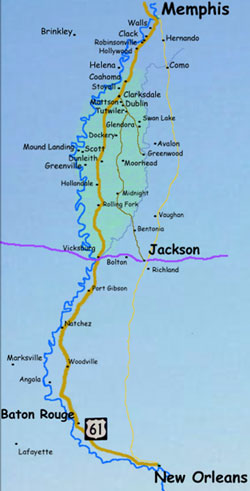REPRINT FROM MISSISSIPPI
MAGAZINE -- MAY/JUNE 2003 (used with
permission)
COMPOSITE MADE FROM -- pages 39, 40, 41
& 42

Music has always played a
major role in the lives of Frank and Eddie Thomas.
Growing up in Iuka, their mother was a choir director, a
position Frank holds today. During the 1960s, Eddie played
trumpet in an award-winning local band and later learned to
play the guitar.
Today, it's the blues that
has captured the brothers' energies. Their latest project
combines authentic Delta blues songs and arrangements with some
of the very spots where those melodies were born.
Frank and Eddie first
attracted attention several years ago when they created a
unique audio cassette self-guided driving tour of the Natchez
Trace Parkway. The 8 1/2 -hour series, "Natchez Trace: A
Road Through the Wilderness," included original music and
tales keyed to the historic road's mile markers. After
experiencing success and critical acclaim, the tow realized
they might be on to something, and they turned their attention
to Mississippi's other famous road-Highway 61. The brothers
planned to research, then record, 61 songs while journeying
down the legendary "Blues Highway." Hours of
listening to scratchy records at the Blues Archive of the
University of Mississippi's Center for the Study of Southern
Culture enabled them to figure out how original composers tuned
their guitars for certain songs. They also learned where many
songs had first been performed. They compiled a list of 120
significant song writers and musicians, whose work they
whittled down to 65 songs-they couldn't bear to narrow it to
61-for the four-CD series, entitled "Angels on the
Backroads." The first two CDs were released in the fall of
2002 and the third in April; the final CD is timed for release
by this summer, since 2003 has been designated the Year of the
Blues.

On October 9, 1998, they made
their first recording amid the hay bales of a barn on Stovall
Farms outside of Clarksdale. "I remember the date and
associating it with the weather," said Eddie, who sings
and plays the music while Frank handles the technical side of
the recordings. "Muddy Waters had left Stovall Farms
(where he had worked for much of his youth) to catch the train
to Chicago, taking the blues with him. We has struggled so hard
to set up in the huge red barn where Muddy Waters might have
been, where he had walked around. Sitting in the barn, a huge
flock of birds flew past, and the way the music sounded in that
barn brought chills."
Later that day, they taped
"Sweet Home Chicago" by Robert Johnson while sitting
on a bench in front of a closed store in Robinsonville, and
Willie Brown's "M & O Blues" while sitting on top
of some tanker railroad cars sidetracked alongside Highway 61.
"It's like a crow's nest up here looking out over ocean
waves of cotton," Frank wrote in the liner notes that
accompany the first CD. "This day lives a life of its own.
A couple of chords, a few gusts of wind, and slowly our ship of
blues begins to move us on a sunward journey."

From a downtown Memphis rooftop to the
choir loft of St. Louis Cathedral in New Orleans, Frank (left)
and Eddie Thomas paid tribute to blues history by recording
their own renditions at some of the same Highway 61 locations
where the legends began
Back in their Iuka studio,
they realized two things: the wind could be heard along with
the music, and this project wasn't going to be as easy as they
had imagined. They considered recording everything in the
studio, but they knew that wouldn't be true to their mission to
use the locations to introduce folks to Mississippi and its
musical heritage.
"It was maybe a year
before we made the next recordings," Frank admitted. While
in Memphis on business, they decided to set up at the
Mississippi River. "lt was an easy day," Frank
recalled, "windy, but we got a good recording."
Eventually they decided the serendipitous background sounds
were an integral part of the settings.
Over the next few years, they
worked their way down Highway 61 playing music and making audio
and photographic records at each stop. They share that journey
on their website, www.angelsonthebackroads.com. In Memphis,
they recorded Frank Stokes' "Downtown Blues" while
riding the Main Street trolley. "I couldn't hear what I
was doing," Eddie said to Frank when they finished.
"Was I in tune?"
Using a vintage trumpet, they
re-created the opening notes of W.C. Handy's "St. Louis
Blues" on top of Memphis' Falls Building. In 1914, Handy
had played that song for the first time in the same spot -then
the "swanky" Alaskan Roof Garden.

Singing birds,
barking dogs, and gusting winds only added to the authenticity
of the brothers’ live music recordings.
While playing "Shetland
Pony Blues" by Eddie James "Son" House in a
field near Robinsonville, a mockingbird landed on a telephone
pole nearby and sang along. When the song ended, the
mockingbird stopped.
The brothers learned that in 1903,
W.C. Handy had fallen asleep at the Tutwiler depot waiting for
a train that was nine hours late. During the night, he was
awakened by a little man playing the guitar and singing
"Goin' Where the Southern Cross' the Dog." It was the
first time Handy had heard the blues.
Frank and Eddie set up for
"Yellow Dog Blues" in Moorhead, the destination
of Handy's little man. They recorded in a gazebo near the
tracks where the Southern Railroad crossed the Yazoo &
Mississippi Valley Railroad, known by locals as the
"Yellow Dog." Just as the music ended, a dog barked
in the distance. "We couldn't have placed it better,"
Frank said. "We said at the time nobody would ever believe
it was real."
At Mounds Landing, where the
Mississippi River levee broke in 1927, they played "High
Water Everywhere" by Charlie Patton. They found the spot
near Vaughan where Casey Jones wrecked the Cannonball, and they
recorded "Kassie Jones" by Furry Lewis almost a
hundred years to the day later.
They received permission to
record inside the derelict King Edward Hotel in Jackson.
"The policemen waited outside...while we set up amid the
rubble," Frank said. "This was a place where
governors and dignitaries had once thrived. It's a bit
frightening to think we might well be the last musicians to
ever play there." In the studio, Eddie added layers of
sound - piano, drums, trumpet and even a jug - to a few of the
songs to make them sound as if a full band were playing. Frank
engineered the sound mix and wrote the liner notes for the CDs
with Eddie's help. "I enjoyed taking the old songs apart
to learn how the musicians tuned and played their
guitars," Eddie said. "Frank is the technical wizard,
making sure the music comes out the way it's supposed to
sound."
Along their journey, they
made friends in unexpected places. In Avalon - the kind of
place where the front of the sign says "Avalon" and
the back reads "Avalon" - they found a man working on
a motor in a repair shop. When they mentioned they were
interested in blues music, the repairman said, "Folks from
California, England, and all over ask about John Hurt all the
time." An older gentleman leaning against the bench told
them he had known Hurt. He led them to the Valley Store where
Hurt used to play music. They set up on the same spot for
"Avalon Blues."

The brothers’ journey traced the
path of the Mississippi on the Blues Highway.
"I could almost feel
John Hurt looking over my shoulder," Eddie said.
"Sometimes there's such a connection. It took my breath
away."
On the final day of
recording, National Public Radio documented Eddie's performance
of "Sweet Hour of Prayer" in the choir loft of New
Orleans' St. Louis Cathedral. The song pays tribute to the warm
and moving spirit of church music and its influence on blues
and jazz. Frank said, "As the last notes faded away on
Eddie's guitar, all of us there could hear music being played
outside in Jackson Square, and then the cathedral bells chimed
two o'clock. It struck us that nothing had stopped just because
we'd completed our journey. The music continues."
The "Angels on the Backroads"
CDs may be ordered by calling 800/896-9892, or through the
Thomas brothers' website, www.angelsonthebackroads.com. Frank
and Eddie now plan to take their music back down Highway 61 on
a concert tour to high schools.
This article written by Carolyn Thornton